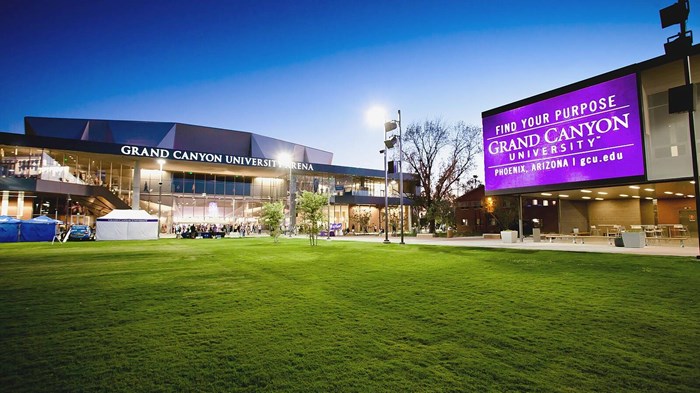
Grand Canyon University (GCU), the largest Christian college in the US, has been fined a record $37.7 million for allegedly misrepresenting the cost of its doctoral programs. Grand Canyon denies the claims and says it’s been “unjustly targeted” by government agencies.
The US Department of Education’s office of Federal Student Aid announced the fine Tuesday, saying Grand Canyon falsely advertised the cost of its doctoral programs and quoted students a lower price than what 98 percent of the programs’ graduates ended up paying.
“GCU lied about the cost of its doctoral programs to attract students to enroll,” said Richard Cordray, of the office of Federal Student Aid. “GCU’s lies harmed students, broke their trust, and led to unexpectedly high levels of student debt. Today, we are holding GCU accountable for its actions, protecting students and taxpayers, and upholding the integrity of the federal student aid programs.”
The Phoenix-based private university—with 25,300 on-campus students and 86,000 more in evening and online courses—represents the biggest recipient of federal student aid over the past four years.
The Department of Education said that since most GCU doctoral students required “continuation courses” to complete their dissertation, 78 percent of them paid at least $10,000 more than the $40,000–$49,000 quoted online. It alleges that the inaccurate tuition quotes go back to at least 2017.
Grand Canyon has denied all allegations. It said it hasn’t misrepresented the time or the cost of the programs and offers a prominent disclosure on the webpage with its program cost calculator.
“In fact, we believe our disclosures related to continuation courses are more extensive than other universities, yet only GCU is being targeted by the Department,” the university wrote in a press release Tuesday in response to the fine.
School officials see the fine as the latest example of undue government scrutiny.
Nearly 20 years ago, GCU made history by becoming the first for-profit Christian college in the country, then transitioned back to a nonprofit in 2018, in part to move away from the “stigma” of collapsed for-profit higher ed outlets. But while it’s recognized by the Internal Revenue Service and other entities, the Department of Education has repeatedly denied GCU’s nonprofit status. The department believes its earnings continue to benefit its former owners, a for-profit company that contracted with the school to provide support services.
GCU has sued over the denial, and last month, it accused the Department of Education, Federal Trade Commission, and Department of Veterans Affairs of retaliating against the university with additional scrutiny as it continues its legal fight for nonprofit recognition.
“Since GCU filed its lawsuit, these agencies have swamped the university and its education partner with broad requests for voluminous amounts of information and records about our operations—the scope of which made it clear these requests were part of a broad fishing expedition to find issue with the university,” Grand Canyon said in a press release.
The university said that “these agenda-driven actions are unprecedented against a 501(c)(3) designated nonprofit university” and that the claims “lack merit and illustrate extreme government overreach in what we believe is an attempt to harm a university to which individuals in these agencies are ideologically opposed.”
An editorial in TheWall Street Journal questioned the “regulatory assault” toward a college that’s growing and keeping tuition costs steady. In addition to the lawsuit issue, the article suggested that “progressive regulators may also dislike that enrollment at the conservative Christian college has been growing while some liberal private colleges struggle.”
The school has made a similar argument. In addition to its growing student body, Grand Canyon says it has invested $1.7 billion in academic platforms since 2009 and has added sports arenas, 30 on-campus housing sites, and a new science building.
“All of the metrics that would typically say to the department we have a troubled university, we have to look into, our metrics are stellar in all of those areas. So, why these little minor investigations,” president Brian Mueller told reporters last month.
The Federal Trade Commission was investigating calls with prospective students, and the Arizona state agency that handles education programs through Veterans Affairs also spoke out against Grand Canyon earlier this year. The agency said GCU’s advertisements that touted the demand for cybersecurity experts were “erroneous, deceptive, or misleading.” It hasn’t taken further action.
As a result of the education department findings, GCU is being asked to amend materials to include the average tuition and fees for its doctoral programs; submit to oversight and disclose its investigations with accreditors or other agencies; and send a notice to students and staff informing them of how to submit a complaint or violations to the department.

Support Our Work
Subscribe to CT for less than $4.25/month


















